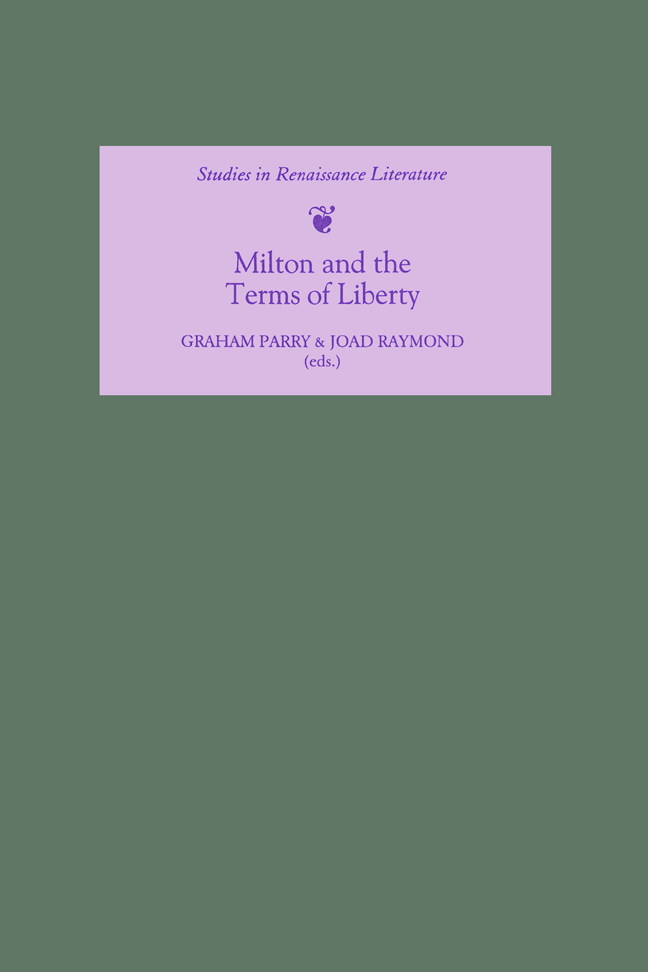Book contents
- Frontmatter
- Contents
- Contributors
- Acknowledgements
- Introduction
- 1 John Milton and the Politics of Slavery
- 2 Milton before ‘Lycidas'
- 3 Prosody and Liberty in Milton and Marvell
- 4 'In These Western Parts of the Empire': Milton and Roman Law
- 5 The King is a Thing
- 6 'in time of Warre … our Language is all corrupt with military Tearms': The Politics of Martial Metaphors in Post-regicide England
- 7 Alexander More Reads Milton: Self-representation and Anxiety in Milton's Defences
- 8 Stylometry and the Provenance of De doctrina christiana
- 9 The Figure and the Ground: Samson as a Hero of London Nonconformity, 1662-1667
- 10 The Publication of the King's Privacy: Paradise Regained and Of True Religion in Restoration England
- 11 'To try, and teach the erring Soul': Milton's Last Seven Years
- 12 Pandemonic Panoramas: Surveying Milton's ‘vain empires’ in the Long Eighteenth Century
- Index
- Studies in Renaissance Literature
11 - 'To try, and teach the erring Soul': Milton's Last Seven Years
Published online by Cambridge University Press: 15 February 2024
- Frontmatter
- Contents
- Contributors
- Acknowledgements
- Introduction
- 1 John Milton and the Politics of Slavery
- 2 Milton before ‘Lycidas'
- 3 Prosody and Liberty in Milton and Marvell
- 4 'In These Western Parts of the Empire': Milton and Roman Law
- 5 The King is a Thing
- 6 'in time of Warre … our Language is all corrupt with military Tearms': The Politics of Martial Metaphors in Post-regicide England
- 7 Alexander More Reads Milton: Self-representation and Anxiety in Milton's Defences
- 8 Stylometry and the Provenance of De doctrina christiana
- 9 The Figure and the Ground: Samson as a Hero of London Nonconformity, 1662-1667
- 10 The Publication of the King's Privacy: Paradise Regained and Of True Religion in Restoration England
- 11 'To try, and teach the erring Soul': Milton's Last Seven Years
- 12 Pandemonic Panoramas: Surveying Milton's ‘vain empires’ in the Long Eighteenth Century
- Index
- Studies in Renaissance Literature
Summary
IN 1667 Milton published Paradise Lost in ten books, looking, as David Norbrook shows, to the model of the Roman republican Lucan's Pharsalia in ten books and often echoing that poem. Following upon that achievement, during the last seven years of his life Milton emphatically did not abandon politics to retreat to a ‘paradise within', as is sometimes supposed. Instead, he took up – sometimes covertly but often with surprising openness – the role of oppositional educator. In both poems and prose texts he sought to advance his readers’ moral and political understanding, in an effort to lead them to internalize the virtues and the love of liberty that alone could enable them – in God's good time – to reclaim religious liberty and a free commonwealth. That case is best made by considering the full range of his writing in these years.
In 1668 he supplied for a reissue of Paradise Lost a note defending his use of blank verse, which flouted the Restoration norm for tragedy or epic, the heroic couplet. That note challenged not only Dryden's defence of rhyme in Of Dramatick Poesie (1667), but also the court culture and royalist politics that nurtured it. Milton offered his blank verse poem as a better model, ‘the first in English, of ancient liberty restored to Heroic Poem from the toublesome and modern bondage of Riming'. His terms – ‘ancient liberty', ‘modern bondage’ – make the choice of blank verse the aesthetic complement to republican politics and culture.
He then set about publishing several works mostly written during his days as a private scholar and schoolmaster in the 1640s. He was cleaning out his desk drawers in an effort to realize additional income, but also turning that housekeeping to good account as a means of testifying against some norms of Restoration culture. In June 1669 his Accedence Commenced Grammar was announced. During the 1660s William Lily's grammar, often reissued, had retained its royal authorization as the prescribed grammar for schools. In his ‘Preface’ Milton targets mature readers, not schoolboys: his comment that those who ‘can discern’ will understand the reasons for his changes from other grammars hints at covert meanings.
- Type
- Chapter
- Information
- Milton and the Terms of Liberty , pp. 175 - 190Publisher: Boydell & BrewerPrint publication year: 2002

